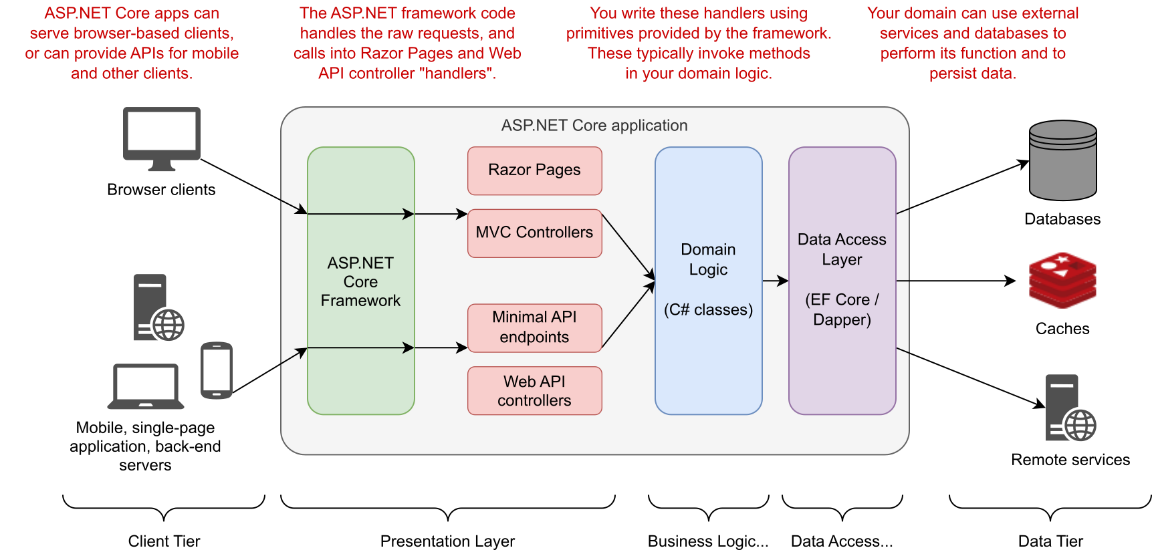.NET Core
Textbook - ASP.NET Core in Action 3rd Edition
What can I build with .NET Core?

Paradigms build on top of ASP.NET Core.
- Minimal APIs—Simple HTTP APIs that can be consumed by mobile applications or browser-based single-page applications.
- Web APIs—An alternative approach to building HTTP APIs that adds more structure and features than minimal APIs.
- .NET WebAPI with React is used for providing a REST API for a client-side Single Page Application (SPA)
- Is WebAPI and OpenAPI compatible? Yes. WebAPI can be setup with Swagger (OpenAPI) documentation
- gRPC APIs—Used to build efficient binary APIs for server-to-server communication using the gRPC protocol.
- RPC framework: Execute procedures on a remote computer through requests
- Razor Pages—Used to build page-based server-rendered applications.
- Use the pages paradigm when your content is structured around action pages --> Like "Contact", "About Us", or "Login"
- MVC controllers—Similar to Razor Pages. Model-View-Controller (MVC) controller applications are for server-based applications but without the page-based paradigm.
- Blazor WebAssembly—A browser-based single-page application framework that uses the WebAssembly standard, similar to JavaScript frameworks such as Angular, React, and Vue.
- Blazor Server—Used to build stateful applications, rendered on the server, that send UI events and page updates over WebSockets to provide the feel of a client-side single-page application but with the ease of development of a server-rendered application
- Downside is that it requires maintaining an internet connection to keep the websocket open
Multiple paradigms can be combined within a single application
What do I want to know about ASP.NET Core?
- I want to know more about the MVC paradigm
- I need to improve my understanding of the traditional MVC paradigm
- View Engine: By default supports Razor and ASPX (Web Forms)
- Model --> Entity framework
- Controller --> Typical register routes stuff
- Why was MVC invented? Why was WebAPI invented?
- Blazor / Razor templating is equivalent to Django / Jinja2 templating?
- What's the difference between razor paradigm and mvc?
- I need to improve my understanding of the traditional MVC paradigm
- I want to understand the tradeoffs between WebAPI, MVC, Razor & Blazor
- I want to scope my requirements and pick the correct technology BASED on those requirements
- Architecture design: abstracting the application and domain logic so it can be used elsewhere
- https://github.com/jasontaylordev/CleanArchitecture/tree/net6.0
- https://code-maze.com/cqrs-mediatr-in-aspnet-core/#:~:text=How%20MediatR%20facilitates%20CQRS%20and,is%20an%20important%20limitation%20here.
- What are the well-established design patterns that ASP.NET is built around?
- Pipelines from Node.js (2009)
- MVC from Ruby on Rails (2002) --> .NET MVC released in (2009)
- ? --> gRPC
- ? --> Blazor / Razor
.NET Technology Overview
- Kestrel: Default websever bundled with .NET
- Improved performance from ASP.NET windows IIS webservers
- Nginx: Reverse proxy I'm familiar with
- Use reverse proxy with webservers because they can handle health checks, load balancing, retries and failover. Separatation of converns with Kestrel only concerned with generating HTTP responses
- NuGet: Package manager for .NET
- Equivalent to npm (js), maven (java), etc.
Versioning of .NET
I'm using .NET 6.0I've chosen .NET 7.0- Features in .NET 7.0 that make me consider migrating
- Output caching middleware (no redis!)
- Rate limiting middleware
- JSON support in EF Core 7.0
- .Net Framework
- ASP.NET Web Forms --> Tied to old System.Web.dll and IIS, so not available on ASP.NET Core
- Can reploace with blazor server which is similar to web forms application model
- Or slowly introduce WebAPI concepts to Web Forms and transition that way
- Windows Communication Foundation (WCF): Only partially supported in ASP.NET Core
- gRPC does WCF's contract-based RPC style without WCF itself
- ASP.NET MVC has similar features to ASP.NET Core but different underlying architecture
- No direct replacement for some features
- ASP.NET Web Forms --> Tied to old System.Web.dll and IIS, so not available on ASP.NET Core